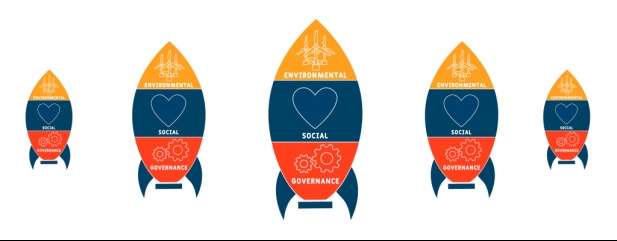Archived article
Please note that tax, investment, pension and ISA rules can change and the information and any views contained in this article may now be inaccurate.
AJ Bell targets best of ESG investing world with new fund

Increasingly people want to put their money into companies that are doing the right thing – whether that’s helping the environment, treating staff fairly or conducting business in a transparent manner. A lot of money is flowing into this space which presents both opportunities and challenges for an investor.
Greater interest means more investment products are becoming available, but investors also risk being overwhelmed with choice. Their options include picking individual stocks themselves or getting a fund manager to choose what goes in a portfolio via an actively managed fund. Investors could even consider a tracker fund that mirrors the performance of a specific index related to the theme.
Another route is to buy a fund that mixes both passive and active management and this is central to the approach taken by the newly launched AJ Bell Responsible Growth Fund (BN0S2V9). It has constructed a portfolio from 12 exchange-traded funds (ETFs) each with a responsible investing tilt, providing exposure to such names as consumer goods group Unilever (ULVR), Japanese electronic component specialist Murata Manufacturing and electric vehicle maker Tesla.
While the fund’s 1% ongoing charges figure is higher than you’d pay if owning each ETF individually, the additional charge pays for an investment specialist to actively manage the asset allocation, changing the weightings for certain products as markets evolve and seeking better and cheaper alternatives as time goes on.
Other funds from AJ Bell have lowered their charges as their size got bigger and the same approach will apply with the Responsible Growth fund, passing on any cost benefits to the investor.
SRI NOT ESG
Eagle-eyed readers may notice that only two of the 12 holdings in AJ Bell’s fund have the term ‘ESG’ in the product name. This may surprise some people as the words ‘environmental, social and governance’ are synonymous with responsible investing along with the term ‘ethical investing’.
The two ETFs with ‘ESG’ in their name will soon be rebranded by their issuer Xtrackers upon which none of the holdings in the AJ Bell fund will carry the ESG moniker.
There is a good logic to this approach. AJ Bell’s investment team have purposely looked at ETFs that follow socially responsible investing (SRI) indices created by MSCI because they have a much tighter focus on the theme, according to Matt Brennan, head of passive portfolios at AJ Bell. ‘SRI and ESG are related, yet SRI goes further,’ he explains.
TWIN APPROACH
Responsible investing funds typically take one of two approaches – negative screening which means excluding companies doing things deemed ‘bad’ by many people such as making cigarettes, or positive screening which refers to companies actively making a positive contribution to a range of ESG themes such as providing affordable healthcare. The ETFs inside the AJ Bell fund incorporate both approaches, thereby sharpening the focus even further.
Brennan says: ‘The starting point for an MSCI SRI index is to exclude companies that don’t have responsible investing characteristics, such as controversial business areas like alcohol, gambling, unconventional oil and gas extraction, adult entertainment, and companies that break UN global impact rules such as breaching workers’ rights.
‘The next step is to remove companies that don’t have at least an A grade on MSCI ESG scores, the ratings ranging from AAA to CCC. Also removed are companies that are subject to controversy like Volkswagen due to its emissions scandal and BP because of the Deepwater Horizon oil spill.’
Of the remaining companies, the top 25% best scoring ones for each sector are targeted. The 25% limit avoids having very large exposure to any one sector which might achieve good scores across lots of companies.
‘ESG indices typically include the top 50% best scoring companies, but SRI is deeper green than ESG by only including the top 25%,’ adds Brennan.
RISK/RETURN CONSIDERATIONS
AJ Bell found five providers with ETFs based on MSCI SRI indices. It studied their relevant products and created a portfolio mainly consisting of equities with a small portion of fixed income on the side (bonds issued by ESG-friendly companies).
One might have expected an all-world product to be the core component, backed up by some country-specific ETFs as satellite holdings. However, the biggest component of the fund is US-focused iShares MSCI USA SRI ETF (SUUS) at 15% of the portfolio.
‘The fund benefits from our optimisation process,’ explains Brennan. ‘You might get better risk/return characteristics with a greater weighting to certain countries than an all-world one, which explains why the US has the biggest weighting in our fund. Some individual country ETFs are also cheaper than all-world ones and is it easier to understand what you are getting.’
WELL-KNOWN NAMES
Some of the names inside iShares MSCI USA SRI ETF include chip company Nvidia, Olay skin care and Pampers nappies seller Procter & Gamble, and Home Depot which is the largest home improvement retailer in the US.
The joint second biggest holding in the AJ Bell fund is Xtrackers ESG MSCI Emerging Markets ETF (XESE) at 13% of the portfolio. It provides exposure to such names as Chinese e-commerce giant Alibaba and shopping platform Meituan Dianping.
At 12.5% of the portfolio is UBS MSCI United Kingdom IMI Socially Responsible ETF (UKSR) which includes stakes in drug maker AstraZeneca (AZN) and utility National Grid (NG.).
Whereas 11 of the 12 ETFs in the AJ Bell fund’s portfolio have a broad SRI focus, there is one outlier in the form of iShares Smart City Infrastructure ETF (CITY).
It has a specific focus on companies that provide services and solutions to build and run smart city infrastructure in a sustainable manner. Here you’ll find names such as power circuits specialist Monolithic Power Systems and stone wool insulation provider Rockwool International.
DISCLAIMER: AJ Bell is the owner and publisher of Shares magazine. The author (Daniel Coatsworth) and editor (Tom Sieber) own shares in AJ Bell.
Important information:
These articles are provided by Shares magazine which is published by AJ Bell Media, a part of AJ Bell. Shares is not written by AJ Bell.
Shares is provided for your general information and use and is not a personal recommendation to invest. It is not intended to be relied upon by you in making or not making any investment decisions. The investments referred to in these articles will not be suitable for all investors. If in doubt please seek appropriate independent financial advice.
Investors acting on the information in these articles do so at their own risk and AJ Bell Media and its staff do not accept liability for losses suffered by investors as a result of their investment decisions.

 magazine
magazine








